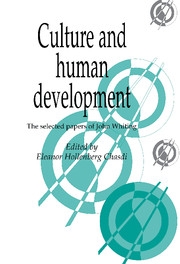Book contents
- Frontmatter
- Contents
- List of figures
- Preface
- Acknowledgments
- Introduction: John Whiting and anthropology
- Fifty years as a behavioral scientist: autobiographical notes
- Part I Theory and methods
- Part II Environment and history
- Part III Moral development
- Introduction
- 6 Sorcery, sin, and the superego: a cross-cultural study of some mechanisms of social control
- 7 Resource mediation and learning by identification
- Part IV Gender development
- Part V Development of social behavior
- Bibliography
- Complete bibliography of John W. M. Whiting's work
- Index
Introduction
Published online by Cambridge University Press: 23 December 2009
- Frontmatter
- Contents
- List of figures
- Preface
- Acknowledgments
- Introduction: John Whiting and anthropology
- Fifty years as a behavioral scientist: autobiographical notes
- Part I Theory and methods
- Part II Environment and history
- Part III Moral development
- Introduction
- 6 Sorcery, sin, and the superego: a cross-cultural study of some mechanisms of social control
- 7 Resource mediation and learning by identification
- Part IV Gender development
- Part V Development of social behavior
- Bibliography
- Complete bibliography of John W. M. Whiting's work
- Index
Summary
This section contains two articles central to Whiting's research on moral development. The first selection explores the motives which keep individuals “in line,” and prevent or punish their deviations from cultural rules. The second presents Whiting's status-envy theory of identification. This theory is the bedrock of Whiting's research in this area, and also provides the conceptual underpinning for all of the articles in the next section, Gender development.
The first article, “Sorcery, sin and the superego: A cross-cultural study of some mechanisms of social control,” groups techniques of social control into three categories. When sorcery is present, people are controlled by fear of their peers – relatives or neighbors who may harm them through their magical practice of sorcery and witchcraft. When individuals fear supernatural powers, such as gods, ghosts, or spirits, they fear to commit transgressions and expect retribution for their sins. When superego functions are highly developed, individuals fear pangs of conscience, bouts of guilt or self-blame, and take responsibility for their own actions.
What accounts for sorcery, sin, or superego control? The reader shares the author's search for theoretical guidelines and the methodological problems inherent in measuring the variables.
For sorcery, the psychoanalytic theory of paranoia as a defense against sexual anxiety is pursued. The variables measured at the cultural level show a strong relationship between sorcery on the one hand, and a long postpartum sex taboo and high punishment for sex in childhood on the other.
For sin and fear of the supernatural, there is support for the belief that the nature of the gods, as perceived by a society, reflects in some way the typical relationship between parent and child in that culture.
- Type
- Chapter
- Information
- Culture and Human DevelopmentThe Selected Papers of John Whiting, pp. 173 - 174Publisher: Cambridge University PressPrint publication year: 1993

